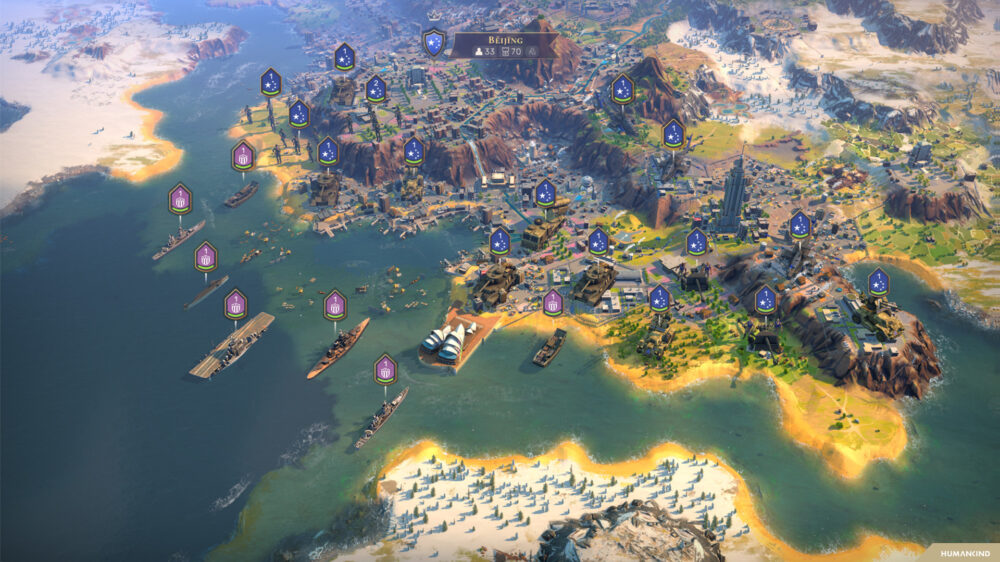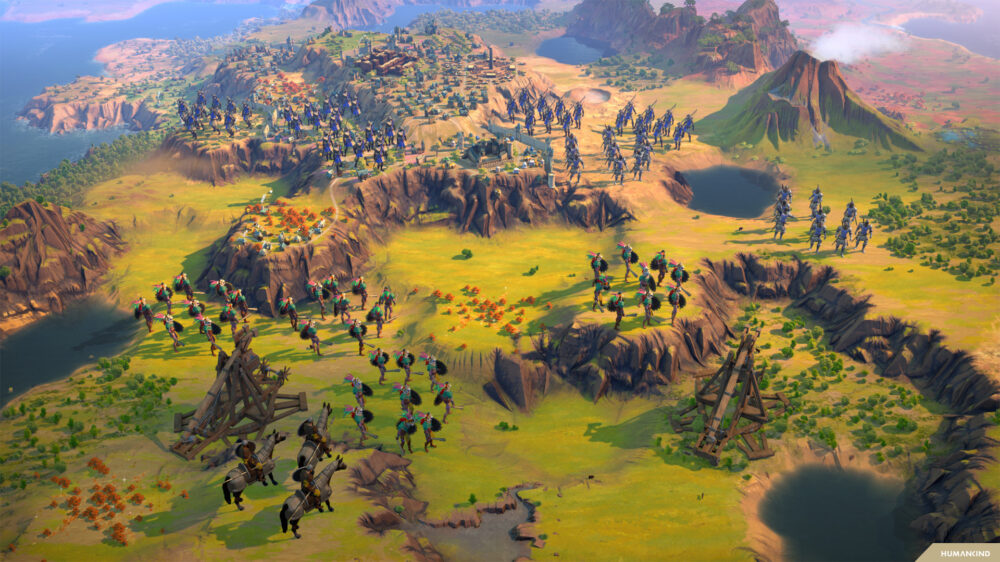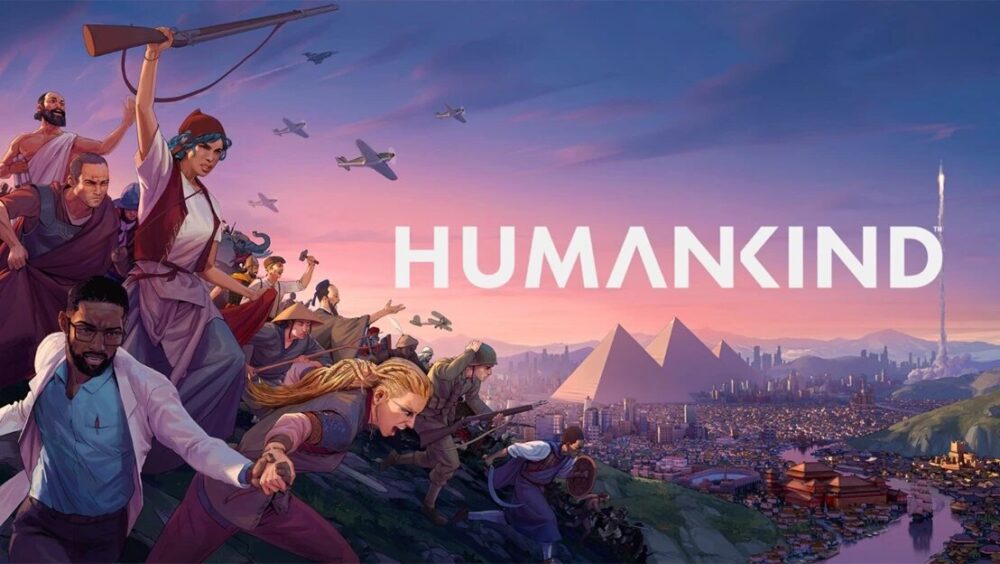“Humankind is a 4X strategy game with a lot of promise and much more to offer than has yet been revealed.”
Humankind is a new and ambitious 4X strategy in development by Amplitude. Offering players the chance to rewrite their own version of history by combining the accolades, armaments and achievements of real-world civilisations across the eras of time gone by, Humankind combines elements of strategy and roleplay into a unique mix never seen before in its genre. Pending its final release, the development team have recently launched a 150-turn OpenDev version of the upcoming title, allowing players to get just a taste of the wider game experience. Playing as the pre-made character Victor, you start out your journey as a meager but eager Nomadic Tribe, alone in the wilderness and seeking a place to settle…

The opening turns of Humankind are not dissimilar to its genre siblings, perhaps most notably Civilization. As is traditional in a 4X strategy of this kind, your initial aim is to find an advantageous position from which to build an increasingly sprawling and prosperous empire. The hex-based map begins largely in the fog of war with just a few tiles around your tribe being visible. Nevertheless, the beautiful design of the game map becomes immediately apparent from the offset, with intricate landscapes rolling in realistic splendour around you. Humankind’s visual fidelity is certainly a step above the competition, and it’s near-true Geography is magnificent. From terrain, to rivers, to the outstanding execution of elevation, I was sincerely impressed as my tribe set out to start its journey.

After finding a place to call home, further game mechanics are revealed which demonstrate both distinct similarities and carefully crafted unique points of difference with similar genre titles. A key distinction is that you do not choose your civilisation prior to the game in Humankind, but rather create (or in the case of the OpenDev, select) a distinct leader to guide your people through the ages. Then, as each age unfolds, you can select an era-appropriate civilisation to inherit the ethos, architecture and unique characteristics and units of. Each civilisation can only be chosen by one player, but each age offers new and stackable options. This allows for an advertised “millions” of different combinations of civilisations for you to craft your story with; a truly awesome and impressive unique selling point for Humankind. Each civilisation is also presented with a specific focus, such as conflict, construction, diplomacy or economic advancement, which allows you to narrow down your options to suit your playstyle.

With a civilisation selected and others on the map making their introductions to your people, the race of advancement and attrition begins to unfold. There are several elements to focus your efforts on as your advance through time and space, but ultimate victory revolves around Humankind’s Fame system. Whether you focus on research, culture, religion, economy, wonders, expansion, diplomacy or a unique combination of strategies, everything contributes and comes down to your civilisation’s Fame. Effectively a scoring system to make comparisons between the complex people’s seeking prosperity on the map, I found Fame to be an effective means of tracking my relative progress but a difficult beast to manipulate and advance. It was never immediately apparent how I could work to increase my Fame, and at times my efforts seemed to merit little to no results. Whilst I appreciate the all-encompassing system as a smart and easy-to-follow mechanic, this is certainly an element that greater tutorial focus needs to be placed on. The promised in-game encyclopedia will also likely shed light upon this critical gameplay element upon Humankind’s final release.

The aforementioned systems which you can exploit on your quest for Fame are complex in Humankind. Whilst the foci of research, culture, diplomacy and religion will be familiar to players of other popular genre titles, their presentation in Humankind comes across a little less straightforward. Granted that the game is as-yet new and largely unfamiliar, the systems did feel more intuitive in my second run of the OpenDev. That being said, I was never truly sure, despite the data presented to me, if what I was doing was “right”, “working” or “making a difference”, which made choices feel both challenging and sometimes inconsequential. I found more straightforward but similarly challenging aspects of the gameplay unfolding on the map itself, too, as well as in any of the game’s various menus

In the early game, it is critical to settle your people near suitable land for both industry and food production, as well as seeking sources of science and specific desirable and strategic resources. Doing so will set your people up for rapid growth and later options for development and trading. It is also important to focus on the neighbouring borders surrounding your cities, and invasions can come quickly and strongly in Humankind, frequently meriting the changing of hands of chunks of your civilisation. Certainly, in spite of my civilisation’s chosen focus in any given game, I found myself at the butt end of the AI’s desire for expansion (again, no matter which civilisation they had inherited and the supposed ideals). I lost cities as quickly as I could make them and was forced to sacrifice my plans for development in favour of pumping out soldiers just to hold the line. I found that this rather bottlenecked the wealth of options for advancement that Humankind put on the table.

In spite of my protests at being bullied by the computer, the actual mechanics of combat are commendable, enjoyable and more strategic than those found in other genre titles. The ability to deploy troops to make best use of the terrain and witness the true attrition of combat was excellent in the OpenDev, from fighting off deer and mammoths to engaging the enemy in one of my frequently captured cities. Wars felt like wars rather than meer flurries of isolated battles, and no loss ever felt unfair or unjust. Conversely, actually attempting to negotiate with the AI often fell on death ears for me, but there is an intelligent system there to be developed upon into the game’s future. As much as one can tell in the first 150 turns of a grander 4X strategy game, the interaction between early civilisations felt tense, challenging and yet plausible and emotive in the responses I felt forced to pursue.

As with any game of such ambitious scale, it is hard to choose the aspects to focus on when previewing a title like Humankind. I have attempted to touch on its various interconnected elements in some detail, but truly there is such a wealth of game to play and enjoy here that even the OpenDev felt as though it barely scratched the surface of what is on offer. There are tweaks that visibly need to be made to bring Humankind up to scratch ahead of its release, and the willingness of the dev team to request and respond to feedback is promising for the game’s future. Despite some criticisms in this wiring, I am truly impressed with the game in its current for and excited to review the finished product which emerges from the positive community engagement which has been at the core of its development so far. Humankind is a 4X strategy game with a lot of promise and much more to offer than has yet been revealed. This is certainly one to watch for genre fans.
Get into the game here https://humankind.game/
Choose your prefered outlet for PC here.
Did you enjoy reading our preview of a game before the game gets its final release and its final version? if yes, click here to find more early previews.








You must be logged in to post a comment.